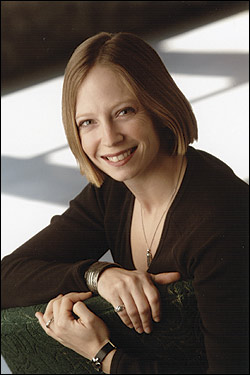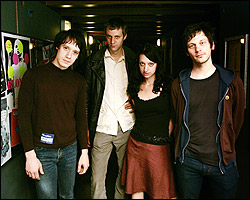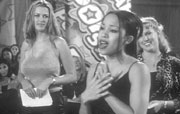According to various press reports, there were close to 150,000 participants in the recent antiwar march in Washington, D.C.—more or less one protester per American soldier serving in Iraq. Kayla Williams might have been at the march if she wasn’t in the middle of her book tour; the former military-intelligence sergeant of the 101st Airborne Division served her year in Iraq, and having seen the inefficiency, chaos, and complete lack of WMDs firsthand, she now has her doubts concerning the war’s validity and the American presence in the Middle East. Although Williams is frank about what she saw and how it makes her feel, Love My Rifle isn’t an insider’s view of what’s wrong with the war.
Instead, Williams’ memoir is about the experience of being a woman during this war. As a female Arabic speaker who might be less physically threatening or intimidating than her male counterparts, it was her job to communicate with the locals, but this aspect of her gender is not the focus.
She writes, “Sex is key to any woman soldier’s experiences in the American military. No one likes to acknowledge it, but there’s a strange sexual allure to being a woman and a soldier.” This is what Williams is talking about. Her style is casual and conversational; she doesn’t waste time or mince words (“Don’t get me wrong. I’ve never much minded the taste of it myself,” she writes about oral sex), but oftentimes she sends an odd message.
“Women at war: you’re automatically a desirable commodity, and a scarce one at that. We call it ‘Queen for a Year.’ Even the unattractive girls start to act up.” Even the unattractive girls felt like a commodity? Well, imagine that. Later, Williams marvels about the “deployment scale of hotness” wherein a girl of “average looks, maybe a little mousy, nothing special” is an eight in country, even though she claims this type of woman wouldn’t get a second glance on American soil. Well, there’s no accounting for taste. Later, she casually notes the “cute little Filipina girls” brought in by Halliburton to feed the troops in Mosul at Christmas. Although she calls their presence “peculiar,” she doesn’t seem to notice that she’s used condescension and stereotype to categorize them. She doesn’t like that male soldiers stare at her chest if she doesn’t wear something over her thin Army T-shirt, but doesn’t appear to realize that she, too, is objectifying women and judging them on their looks. Williams’ double standards don’t necessarily deaden her argument; to hear her tell it, a lot of male soldiers in Iraq truly are total pigs (and, sure, some are great human beings), but Love My Rifle isn’t a feminist text.
The book is strongest when Williams simply details the experience of being a soldier. Her approachable style is probably a lot like reading her letters or e-mails. Reading how her nerves gradually fizzle and the war starts to get to her, a clear picture of this extremely messy conflict unfolds.
“All of us, guys and girls, were in a situation in Iraq where we were powerless much of the time. And then we found ourselves in this situation where we had all this power over another person. And suddenly we could do whatever the fuck we wanted to them,” she writes.
Williams doesn’t forgive her fellow soldiers for being racist, sexist, or immoral, but she forgives them for being human. In those places, her story is worth reading.








